Search News
For the Media
For media inquiries, call CWA Communications at 202-434-1168 or email comms@cwa-union.org. To read about CWA Members, Leadership or Industries, visit our About page.
Nationwide Bipartisan Survey Finds Strong Opposition to "Fast Track"
Americans are telling Congress to slow down.
A nationwide, bipartisan survey found than 62% of voters say they oppose "fast track" legislation that would speed approval of trade deals like the Trans-Pacific Partnership. After hearing an equal number of arguments that have been made by organizations supporting and opposing fast track, voter opposition grew to 65%, including 45% indicating that they are "strongly opposed."
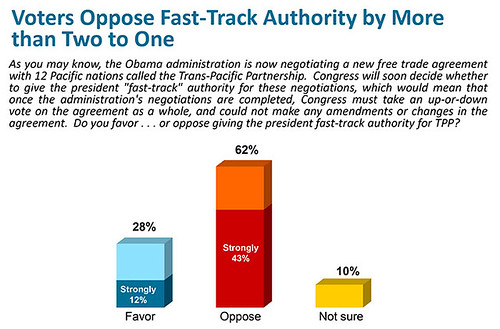
Demographically, opposition is very broad, with no more than one-third of voters in any region of the country or in any age cohort favoring fast track. Sixty percent of voters with household incomes under $50,000 oppose fast track, as do 65% of those with incomes over $100,000.
Republicans overwhelmingly oppose fast-track authority (8% in favor, 87% opposed), as do independents (20%-66%), while a narrow majority (52%) of Democrats are in favor (35% opposed).
Hart Research Associates, a Democratic pollster, and Chesapeake Beach Consulting, a Republican polling firm, conducted the survey Jan. 14-18. It was jointly sponsored by CWA, Sierra Club and the U.S. Business and Industry Council. Read the full results and listen to the audio of the press call here.
Voters are deeply troubled by the fast track process.
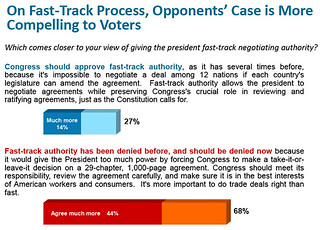
~~~~
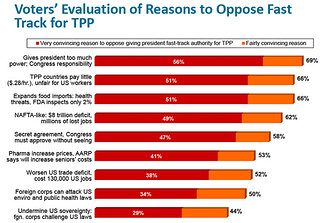
So much so that poll also found that members of Congress who vote to approve fast track -- especially Republicans -- are taking a political risk.
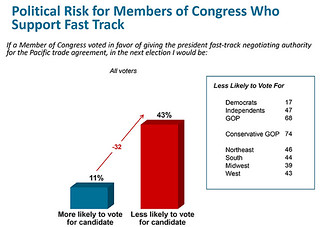
To many Americans, fast track will result in a TPP that will lower wages and cost the United States jobs.
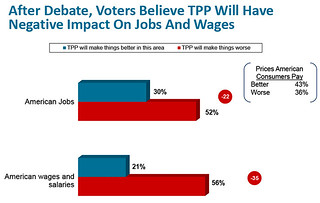
They worry that the TPP will undermine important environmental protections and put consumer safety at risk.
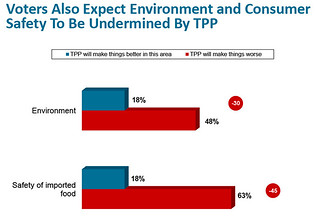
And voters believe the TPP will be a good deal for big corporations at the expense of America's small businesses.
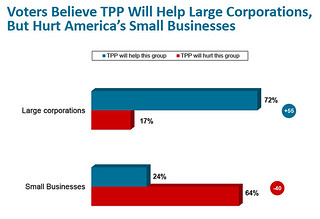
Opponents of the trade agreements -- and of the fast track legislation needed to clear the way for their approval in Congress -- have been organizing steadily around the issue, and in recent weeks have intensified their argument that past trade agreements have hurt U.S. workers more than they have helped.
In a conference call on Wednesday, labor and environmental groups said that a recent poll they commissioned showed deep skepticism about trade agreements, and strong sentiment against fast track legislation because it gives the president "too much power."
Larry Cohen, president of the Communications Workers of America and vocal opponent of the trade legislation, said that between the labor, environmental and other groups that are active on the issue, "voters will be energized. . .It is small business. It is everybody. Americans are saying what kind of future do we want? We don't want a trillion-dollar trade deficit."
Opposition to free trade deals, and by extension fast-track power, comes partly from consumer groups, environmentalists and unions, a power base for Obama's Democrats, many of whom worry about lost jobs and weaker labor and environmental standards.
More than 550 lobby groups have written to lawmakers urging them to vote against a TPA bill introduced in the House and Senate and opponents released a poll of 816 voters showing 62 percent were opposed to fast-track power for the Trans-Pacific Partnership (TPP).
"Trade agreements are no longer just about tariffs and quotas. They are about the food we eat, the air we breathe, the jobs we hold. We cannot abdicate this process to non-elected representatives," said Larry Cohen, president of the Communications Workers of America, which co-sponsored the poll.